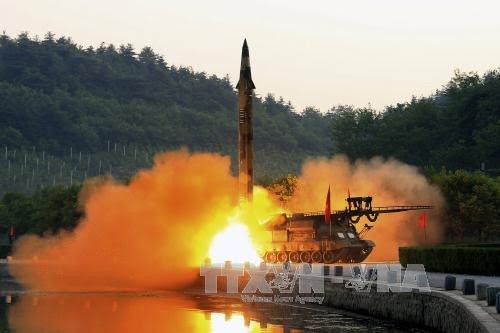 North Korea fired ballistic missile at an unknown location (Photo: EPA/VNA) North Korea fired ballistic missile at an unknown location (Photo: EPA/VNA) |
On September 11, the UN Security Council unanimously approved new and stronger than ever sanctions against North Korea. This was the 9th punitive measure adopted by the Council since 2006 and the 2nd this year. The sanctions, which ban the regime from trading certain textiles, natural gas, and oil products, will cause North Korea an annual loss of 1.3 billion USD.
Stronger message
President Donald Trump ordered new US sanctions on individuals, companies and banks doing business with North Korea. China, for the first time, sent a strong message by banning textile and seafood imports from, and oil, iron ore, and coal exports to, North Korea. Observers say Beijing’s textile trade ban will deliver a strong blow to the North Korean economy, because textiles are the 2nd largest source of hard currency for the regime, after coal and minerals. Last year, North Korea earned more than 750 million USD from textile exports, of which the Chinese market accounted for 80%. The branches of 3 of China’s biggest banks – Bank of China, China Construction Bank, and Agriculture Bank of China in the border city of Yanj – have banned North Koreans from opening new accounts or transferring money.
Beijing’s move has pleased Washington, who said China was not serious enough in restricting its neighbor. Despite pervious sanctions, China’s exports to North Korea increased 30% and bilateral trade surged 10% to 2.6 billion USD in the first half of this year.
Direct impacts
The strongest ever sanctions are directly affecting the lives of people living on the China-North Korea border. In Hunchun town in China’s Jilin province, dozens of protests have occurred, forcing shops to close. China’s northeastern towns, already suffering from the decline of the mining industry, are now struggling to survive the sanctions aimed at North Korea. Factories in an industrial park in Shenyang are shut down and the workers are waiting for jobs on the streets. Chinese Foreign Ministry Spokeswoman Hua Chunying said, “The Chinese side has fully and strictly implemented the relevant resolutions of the UN Security Council, and has made great sacrifices for this at great cost.”
Is punishment the best solution?
North Korea has defied the UN’s 9 rounds of sanctions since 2006. Observers say world pressure on Pyongyang is insufficient. The Chinese government, which wants stability on its northeastern border, knows the recent tough sanctions are just “a slap on the wrist.” Beijing understands the price it has to pay for the sanctions. An instable domestic economy and instablity on the Korean peninsula would pave the way for greater US influence in the region. But right now, China has to join the international efforts to court improved relations with the US.
Over the past 11 years, international sanctions have failed to prevent North Korea from developing its nuclear missile arsenal. Punishment needs to accompany strategic negotiations, which right now are nowhere in sight.